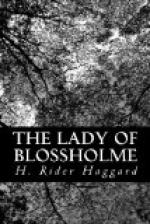“Why do you hunt me across my own park and come knocking so rudely at my doors, my Lord Abbot?” asked Christopher, leaning on the parapet of the gateway.
“Why do you work murder on my servant, Christopher Harflete?” answered the Abbot, pointing to the dead man in the snow. “Know you not that whoso sheds blood, by man shall his blood be shed, and that under our ancient charters, here I have the right to execute justice on you, as, by God’s holy Name, I swear that I will do?” he added in a choked voice.
“Aye,” repeated Christopher reflectively, “by man shall his blood be shed. Perhaps that is why this fellow died. Tell me, Abbot, was he not one of those who rode by moonlight round King’s Grave lately, and there chanced to meet Sir John Foterell?”
The shot was a random one, yet it seemed that it went home; at least, the Abbot’s jaw dropped, and some words that were on his lips never passed them.
“I know naught of the meaning of your talk,” he said presently in a quieter voice, “or of how my late friend and neighbour, Sir John—may God rest his soul—came to his end. Yet it is of him, or rather of his, that we must speak. It seems that you have stolen his daughter, a woman under age, and by pretence of a false marriage, as I fear, brought her to shame—a crime even fouler than this murder.”
“Nay, by means of a true marriage I have brought her to such small honour as may be the share of Christopher Harflete’s lawful wife. If there be any virtue in the rites of Holy Church, then God’s own hand has bound us fast as man can be tied to woman, and death is the only pope who can loose that knot.”
“Death!” repeated the Abbot in a slow voice, looking up at him very curiously. For a little while he was silent, then went on, “Well, his court is always open, and he has many shrewd and instant messengers, such as this,” and he pointed to the arrow in the neck of the slain soldier. “Yet I am a man of peace, and although you have murdered my servant, I would settle our cause more gently if I may. Listen now, Sir Christopher; here is my offer. Yield up to me the person of Cicely Foterell——”
“Of Cicely Harflete,” interrupted Christopher.
“Of Cicely Foterell, and I swear to you that no violence shall be done to her, nor shall she be given to a husband till the King or his Vicar-General, or whatever court he may appoint, has passed judgment in this matter and declared this mock marriage of yours null and void.”
“What!” broke in Christopher scoffingly; “does the Abbot of Blossholme announce that the powers temporal of this realm have right of divorce? Ere now I have heard him argue differently, and so have others, when the case of Queen Catherine was in question.”
The Abbot bit his lip, but continued, taking no heed—
“Nor will I lay any complaint against you as to the death of my servant here, for which otherwise you should hang. That I will write down as an accident, and, further, compensate his family. Now you have my offer—answer.”




